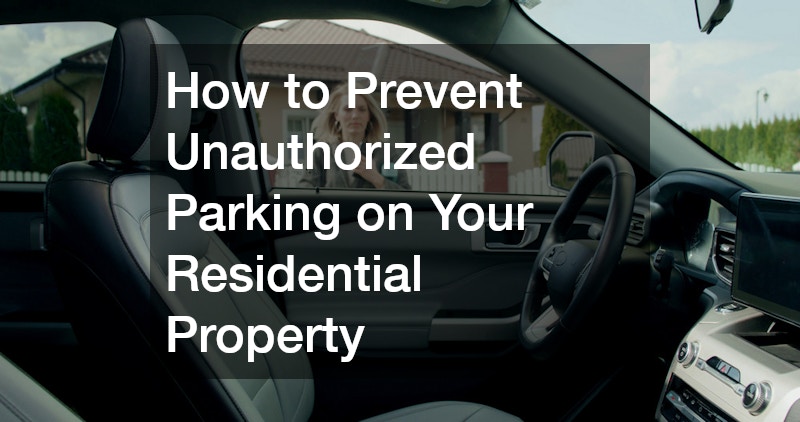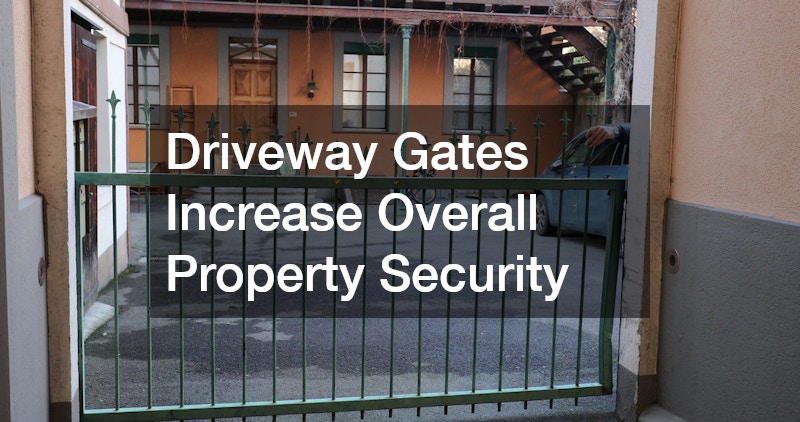Highlights:
-
Unauthorized parking can reduce safety, tenant satisfaction, and property value.
-
Legal compliance is essential—always know local towing and signage requirements.
-
Physical barriers, signage, and communication reduce violations before enforcement is needed.
-
Towing companies offering private impound towing provide the most effective enforcement option.
-
Technology solutions like LPR cameras and smart permits modernize parking management.
-
Consistent enforcement and preventive measures ensure long-term success.

Unauthorized parking on residential property is more than just a nuisance—it can create safety hazards, inconvenience residents and guests, and even reduce property value. From strangers using your driveway to neighbors overstepping boundaries, this issue frustrates many homeowners, landlords, and property managers.
Preventing unauthorized parking requires a mix of legal knowledge, physical deterrents, effective communication, and enforcement measures. One of the strongest tools available to property owners is working with towing companies that offer private impound towing. But before jumping straight to enforcement, it’s essential to understand the full range of strategies that can protect your property and maintain good community relations.
This article explores practical, legally sound ways to prevent unauthorized parking on your residential property—whether you manage a single-family home, a multi-unit rental, or a larger residential community.
Understanding Unauthorized Parking
Unauthorized parking happens when someone parks on private residential property without permission. It can take many forms:
-
Driveway intrusions: Neighbors or delivery drivers blocking access to your garage.
-
Overflow parking: Tenants’ guests or nearby residents using your spaces without approval.
-
Random overnight parking: Strangers leaving cars for extended periods, especially in urban or high-traffic areas.
-
Abandoned vehicles: Cars left for days or weeks, creating safety and liability concerns.
Why It Matters
Unauthorized parking is not just inconvenient—it can have serious consequences:
-
Safety risks: Blocked driveways or fire lanes can prevent emergency vehicle access.
-
Liability issues: If a car parked without permission is damaged, the property owner may still face disputes.
-
Tenant dissatisfaction: Renters who consistently lose their spaces may choose to move out, affecting occupancy rates.
-
Reduced property value: Ongoing parking problems can lower curb appeal and desirability.
Understanding these risks helps frame why prevention should be a priority for any homeowner or property manager.
Legal Rights and Considerations
Before acting, property owners should understand the legal framework surrounding parking enforcement. Parking laws vary by city and state, so always check local regulations.
Key Points to Know
-
Private vs. public property: Enforcement options differ depending on whether the space is a private driveway, a shared lot, or a street under city control.
-
Trespassing laws: Unauthorized parking is typically considered trespassing, but enforcement requires clear signage and proper procedures.
-
Towing regulations: Many jurisdictions require property owners to post visible, legally compliant signs before arranging a tow.
-
Law enforcement involvement: Police generally won’t intervene unless the vehicle poses a safety hazard (e.g., blocking a fire hydrant). For non-emergencies, property owners usually need private solutions.
By knowing your rights, you can set up an enforcement system that is both effective and defensible if challenged.
Physical Barriers and Property Modifications

One of the most straightforward ways to stop unauthorized parking is to physically block access. Property modifications can be highly effective, but they require investment and maintenance.
Options for Physical Deterrents
-
Driveway gates:
-
Can be manual or automated.
-
Provide complete control over who enters.
-
Increase overall property security.
-
-
Parking posts or collapsible bollards:
-
Installed at individual parking spaces.
-
Allow residents to lock and unlock as needed.
-
Cost-effective compared to full fencing.
-
-
Curb painting (where permitted):
-
Marking areas with “No Parking” or property-specific color codes.
-
Legally recognized in some jurisdictions when combined with signage.
-
-
Fencing and landscaping:
-
Hedges, decorative fences, or planters can serve as natural barriers.
-
Add curb appeal while discouraging unwanted parking.
-
Pros and Cons
-
Advantages: Immediate deterrent, increases sense of security, adds value to the property.
-
Disadvantages: Initial cost, possible inconvenience to residents, and maintenance requirements.
Physical deterrents are especially useful when unauthorized parking is a frequent or predictable issue.
Clear Communication and Signage
Often, unauthorized parking stems from confusion rather than deliberate rule-breaking. Clear communication and well-placed signage can eliminate misunderstandings.
Best Practices for Signage
-
Use strong, legally compliant language, such as:
-
“Private Property – Unauthorized Vehicles Will Be Towed at Owner’s Expense.”
-
“Resident Parking Only – Permit Required.”
-
-
Ensure signs are visible at all property entrances and near parking areas.
-
Choose reflective or illuminated signs for visibility at night.
-
Avoid overly aggressive wording that may escalate tension.
Communication with Residents and Guests
-
Include parking rules in lease agreements and welcome packets.
-
Provide maps showing assigned spaces and guest parking zones.
-
Remind tenants regularly through newsletters, notices, or email updates.
Proper communication prevents unintentional violations and strengthens your case if enforcement becomes necessary.
Enforcement Measures
Even with signs and barriers, unauthorized parking may still occur. That’s when enforcement becomes essential.
Partnering with Towing Companies
The most effective enforcement strategy is to work with towing companies that offer private impound towing. These companies:
-
Remove unauthorized vehicles quickly and legally.
-
Operate under agreements that give them the right to patrol or respond on call.
-
Typically shift costs to the vehicle owner, not the property owner.
-
Provide documentation, photos, and receipts for legal protection.
Other Enforcement Tools
-
Parking permits: Assigning permits to residents and guests helps distinguish authorized vehicles.
-
Warning notices: Placing a written warning on a vehicle’s windshield before towing can reduce conflict.
-
Security patrols: For larger residential complexes, patrols can check for compliance regularly.
-
Surveillance cameras: Video evidence deters violations and supports towing actions.
Key Considerations
-
Always document violations with photos and timestamps.
-
Follow local laws for notice and signage to avoid disputes.
-
Work with towing companies experienced in residential enforcement to minimize liability.
Working with Neighbors and Community
Parking disputes often arise from strained relationships with neighbors or tenants. Preventing unauthorized parking is easier when you foster cooperation rather than conflict.
Tips for Building Cooperation
-
Talk to neighbors: A polite conversation may solve recurring issues without escalating to enforcement.
-
Lease agreements: Clearly state parking rules, assigned spaces, and penalties for violations.
-
Homeowners’ associations (HOAs): Develop consistent parking policies across the community.
-
Community meetings: Provide opportunities for residents to voice concerns and suggest improvements.
By handling issues with diplomacy first, you can maintain positive relationships while keeping your parking spaces protected.
Technology Solutions
Modern technology provides property owners with more tools than ever to manage parking effectively.
Options to Consider
-
License Plate Recognition (LPR) systems: Cameras automatically log vehicles entering the property, identifying unauthorized cars.
-
Smart gates: Residents can use apps or remote controls to grant access to guests.
-
Digital parking permits: Residents and visitors can register vehicles online, making enforcement easier.
-
Notification systems: Text alerts can inform residents when an unauthorized car is detected in their space.
Technology solutions can be expensive upfront but save time and stress in the long term by automating enforcement.
Preventing Future Issues
Unauthorized parking should be addressed proactively, not just reactively.
Preventive Strategies
-
Regular policy reviews: Update parking rules to reflect changing needs.
-
Routine inspections: Walk the property regularly to identify violations early.
-
Consistent enforcement: Enforce rules fairly and consistently to build credibility.
-
Incident documentation: Keep detailed records of all violations, warnings, and towing actions to protect against legal disputes.
-
Ongoing education: Remind tenants and residents about parking rules at move-in and throughout their tenancy.
Taking proactive measures ensures your property remains free of recurring parking problems.
In Summary
Unauthorized parking is more than just an inconvenience—it poses safety risks, frustrates tenants, and can even lower a property’s overall value. The most effective way to address this challenge is through a layered approach that blends deterrence, communication, and enforcement.
Physical barriers such as gates or bollards help prevent casual intrusions, while clear signage establishes legal rights and reduces misunderstandings. Open communication with tenants and neighbors fosters cooperation, ensuring everyone understands the parking rules and their responsibilities.
When enforcement becomes necessary, partnering with towing companies that offer private impound towing provides a reliable solution to remove unauthorized vehicles while protecting the property owner’s interests. Finally, adopting technology solutions like license plate recognition or digital permits streamlines monitoring and adds an extra layer of security.
By combining these strategies, property owners can develop a fair and effective system that prevents unauthorized parking while preserving positive community relationships.